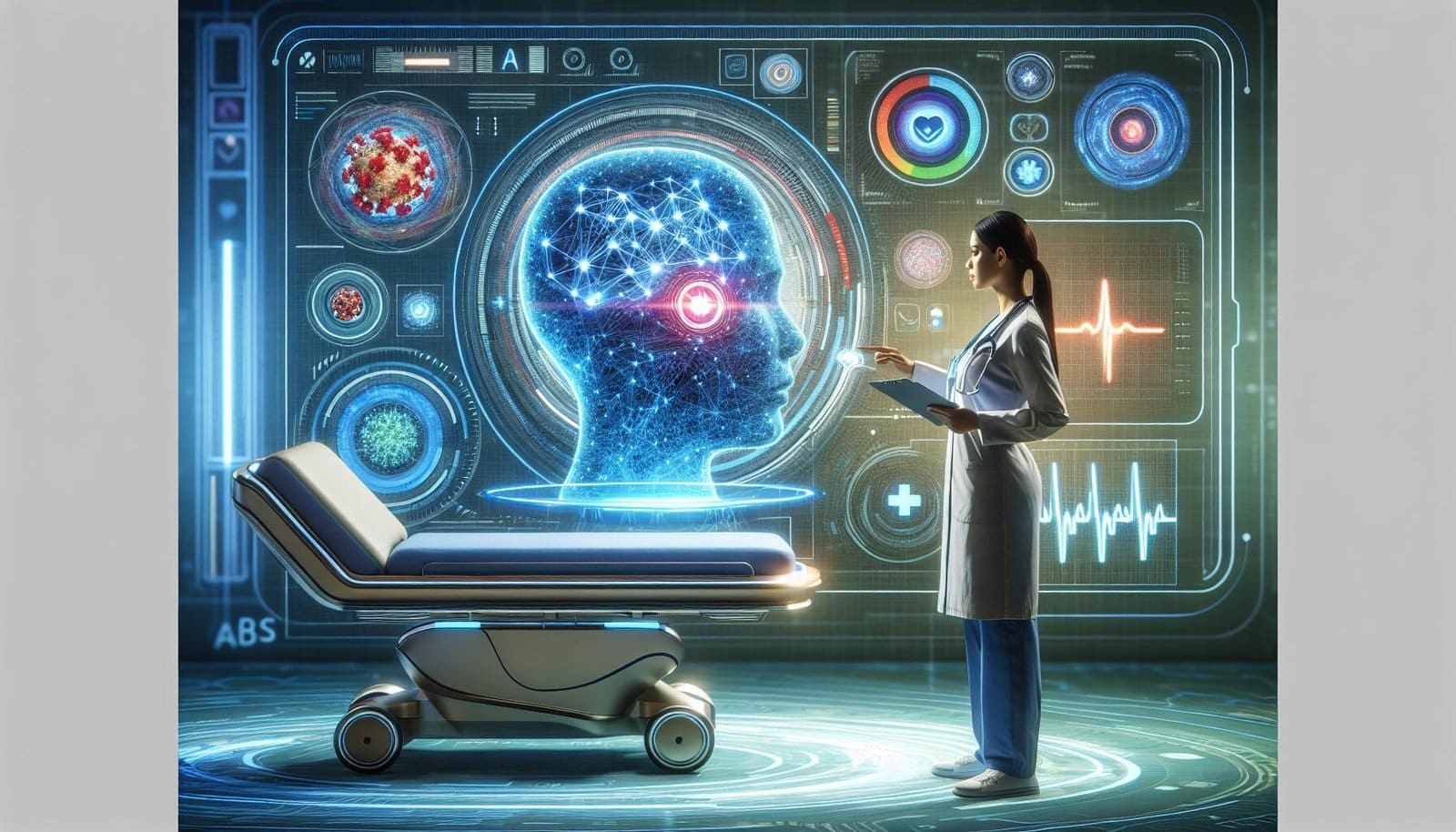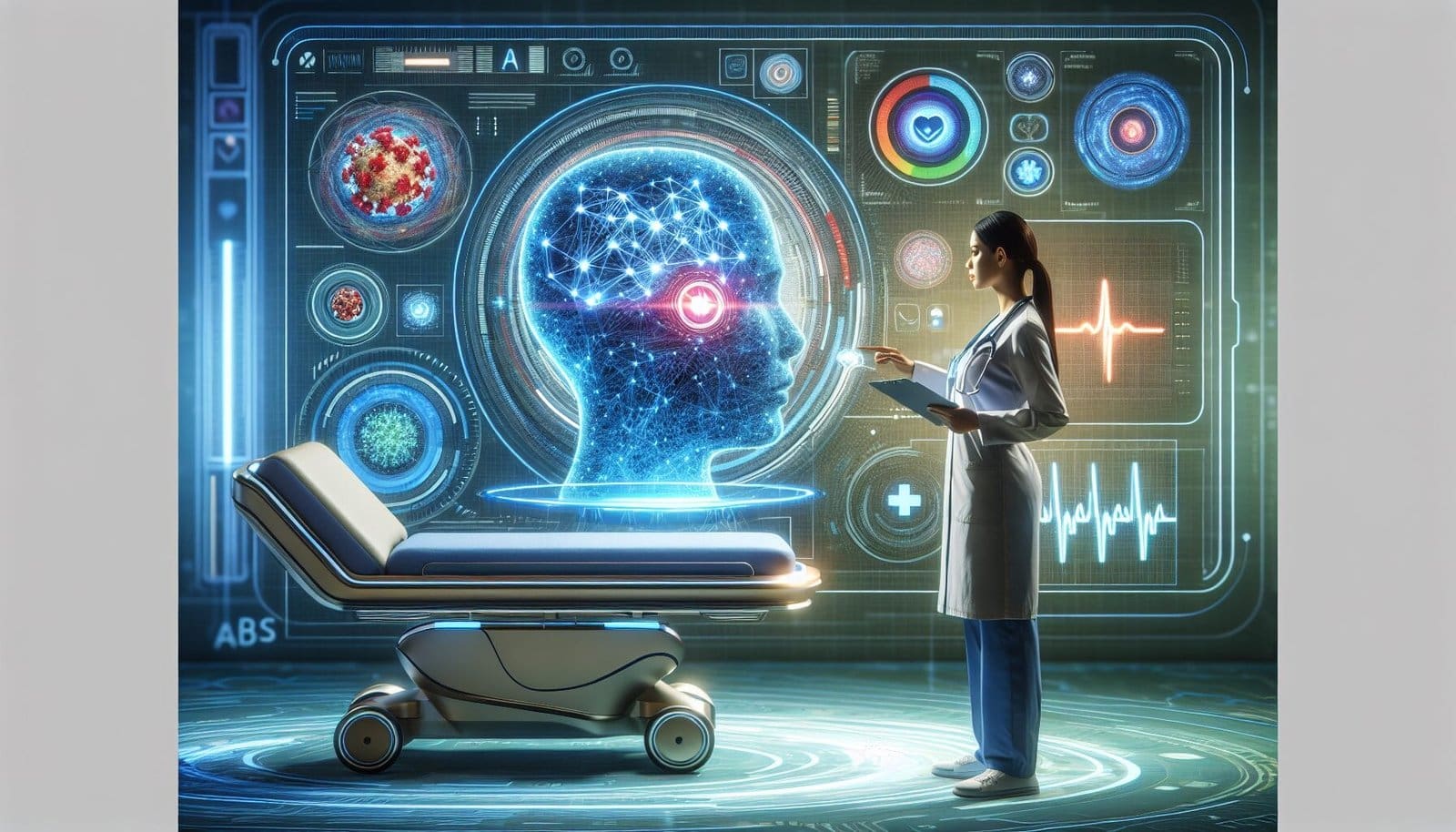Artificial intelligence (AI) has made significant advancements across various industries, revolutionizing the way we work and live. In the field of healthcare, its applications have the potential to improve patient care, increase efficiency, and enhance diagnostic accuracy. From assisting in medical imaging analysis to predicting disease outbreaks, AI is paving the way for more precise and personalized healthcare solutions. In this article, we will explore the diverse applications of artificial intelligence in the healthcare sector, highlighting its role in transforming the delivery of medical services and ultimately improving patient outcomes.

Improving diagnostics and disease management
In the field of healthcare, one of the key areas where artificial intelligence (AI) is making significant contributions is in improving diagnostics and disease management. By harnessing the power of machine learning algorithms, AI is revolutionizing the accuracy of medical diagnosis. These algorithms are capable of analyzing vast amounts of data and identifying patterns that might otherwise go unnoticed by human clinicians. This not only improves the accuracy and speed of diagnoses but also enhances patient outcomes.
AI-assisted imaging analysis is another crucial application of AI in healthcare. Medical imaging is a fundamental tool for diagnosis and treatment planning, but the interpretation of these images can be time-consuming and prone to human error. AI algorithms can analyze medical images with remarkable precision, assisting healthcare professionals in detecting abnormalities and making more accurate diagnoses. This technology not only saves time but also contributes to more effective treatment decisions.
Early disease detection and prevention are paramount in healthcare, and AI is playing a significant role in this domain. By utilizing machine learning algorithms and predictive modeling techniques, AI can identify subtle changes in patient data that may indicate the early stages of a disease. This enables healthcare professionals to intervene at an earlier stage, potentially leading to more successful treatment outcomes. AI can also help in predicting diseases by analyzing vast amounts of data and identifying risk factors, empowering individuals to take proactive steps to prevent certain health conditions.
Another area where AI is proving invaluable is in disease management. AI-based predictive analytics can assist healthcare professionals in anticipating disease progression and treatment response, enabling them to tailor treatment plans and interventions accordingly. By analyzing patient data such as past medical history, genetic information, lifestyle factors, and environmental influences, AI algorithms can generate actionable insights to optimize disease management strategies. This ensures that healthcare professionals can provide personalized and effective care, leading to improved patient outcomes.
Enhancing precision medicine
Precision medicine aims to provide tailored treatment plans based on individual patient characteristics. AI is revolutionizing the field of precision medicine by enabling personalized treatment plans with the help of advanced algorithms. By analyzing patient data, including genetic information, medical history, and lifestyle factors, AI can identify optimal treatment options for individual patients. This not only increases the chances of successful treatment but also reduces the risk of adverse reactions to medications.
Genetic analysis is a complex task that can be greatly enhanced by the power of AI. AI algorithms can analyze vast amounts of genetic data and identify patterns and mutations that may be relevant to specific diseases or conditions. This information can help healthcare professionals in making more informed decisions about treatment options, as well as in predicting disease risks in certain individuals. AI-driven genetic analysis has the potential to unlock new insights into the genetic basis of diseases, leading to advancements in personalized medicine.
Another significant contribution of AI in precision medicine is optimizing medication and dosage. AI algorithms can analyze patient data, including genetic information, to identify the most effective medications and dosages for individual patients. This not only improves treatment outcomes but also reduces the risk of adverse reactions. By taking into account factors such as drug-drug interactions and genetic variations that may affect medication response, AI algorithms can help healthcare professionals provide more precise and personalized treatment plans.
Empowering healthcare professionals
AI is not only benefiting patients but also empowering healthcare professionals by providing valuable tools and support. AI-powered electronic health records (EHRs) streamline the documentation process, making it more efficient and reducing the burden on healthcare professionals. These intelligent systems can automatically extract relevant information from patient records, suggest diagnoses based on symptoms, and provide real-time alerts for potential drug interactions or allergies. By automating administrative tasks, AI-powered EHRs free up time for healthcare professionals to focus on patient care.
Virtual assistants are another valuable application of AI in healthcare. These conversational agents can assist healthcare professionals by providing instant access to patient information, clinical guidelines, and research literature. Virtual assistants can also help with appointment scheduling, medication reminders, and other administrative tasks, further enhancing the efficiency of healthcare professionals. By utilizing natural language processing and machine learning techniques, these virtual assistants can understand and respond to user queries, providing valuable support in clinical decision-making.
Decision support systems are another area where AI is revolutionizing healthcare. These systems utilize advanced algorithms to analyze patient data and provide evidence-based recommendations to healthcare professionals. By integrating patient-specific information, clinical guidelines, and medical research, decision support systems can help healthcare professionals make informed decisions about diagnosis, treatment plans, and medication selection. This not only improves the quality of care provided but also reduces the risk of medical errors and ensures consistency in decision-making.
AI chatbots are yet another AI-powered tool that is transforming the patient experience by providing personalized support and assistance. These chatbots can interact with patients, answer their queries, provide health-related information, and offer emotional support. By utilizing natural language processing and machine learning techniques, AI chatbots can understand and respond to patient queries in a conversational manner, enhancing patient engagement and satisfaction. These chatbots can also provide reminders for medication intake, appointments, and lifestyle modifications, empowering patients to take control of their health.
Revolutionizing medical research
AI is also revolutionizing the field of medical research by facilitating drug discovery and development. Traditional drug discovery is a time-consuming and expensive process, but AI has the potential to accelerate this process significantly. By analyzing vast amounts of data, including molecular structures, clinical trial results, and scientific literature, AI algorithms can identify potential drug candidates and predict their efficacy and safety. This leads to faster identification of promising drug candidates, reducing the time and cost associated with drug development.
AI-enabled data analysis and pattern recognition are also crucial in medical research. With the vast amount of data available in healthcare, it can be challenging for researchers to identify meaningful patterns and insights. AI algorithms can rapidly analyze large datasets and identify trends, correlations, and patterns that may not be apparent to human researchers. This enables researchers to make data-driven decisions, discover new associations, and uncover hidden insights that may lead to breakthroughs in medical research.
Predictive modeling is another valuable application of AI in medical research. By utilizing historical patient data and clinical trial data, AI algorithms can model disease progression, treatment response, and patient outcomes. These predictive models can help researchers design more efficient clinical trials, identify patient populations that are most likely to benefit from certain interventions, and optimize treatment strategies. Furthermore, AI-driven predictive models can also assist in identifying novel biomarkers and potential targets for therapeutic interventions, leading to advancements in precision medicine.
AI-driven precision research is yet another domain where AI is contributing to medical research. By analyzing large amounts of research data, AI algorithms can identify knowledge gaps, highlight areas for further investigation, and provide insights into research priorities. This enables researchers to optimize their research efforts and focus on areas that have the potential to make the most significant impact. AI also facilitates collaboration and knowledge sharing by connecting researchers with similar interests and expertise, fostering innovation and enhancing the pace of medical research.

Improving patient experience and engagement
AI has the potential to greatly improve the patient experience and engagement by providing personalized care and innovative solutions. AI-based personalized care ensures that each patient receives tailored treatment and support based on their individual characteristics, preferences, and needs. By analyzing patient data and providing real-time feedback, AI algorithms can assist individuals in making informed decisions about their health, managing chronic conditions, and adopting healthy lifestyle choices. This personalized approach not only improves patient outcomes but also enhances patient satisfaction and engagement.
Virtual reality (VR) is a technology that holds tremendous promise in pain management. By immersing individuals in a virtual environment, VR can distract them from their pain and provide a more positive and engaging experience. This technology has been particularly effective in managing pain during medical procedures, such as wound dressing changes or dental procedures. By reducing anxiety and discomfort, VR enhances the patient experience and improves patient satisfaction.
Health monitoring and wearables are another area where AI is transforming patient care. With the increasing availability of wearable devices, individuals can track various aspects of their health, including physical activity, heart rate, sleep patterns, and more. AI algorithms can analyze this data and provide valuable insights to individuals and healthcare professionals. This information can be utilized to detect early signs of certain health conditions, monitor treatment response, and encourage healthy behaviors. By empowering individuals to actively participate in their own healthcare, the use of AI in health monitoring and wearables promotes a sense of ownership and engagement.
Telemedicine and remote patient monitoring are yet another area where AI is revolutionizing healthcare. With the advancement of technology, individuals can now receive medical consultations and monitor their health remotely, without the need for physical visits to healthcare facilities. AI-driven telemedicine platforms enable patients to connect with healthcare professionals through video calls, chat interfaces, or mobile apps. This not only improves access to healthcare, particularly for individuals in remote or underserved areas but also reduces healthcare costs and enhances convenience. Furthermore, remote patient monitoring with the help of AI algorithms enables healthcare professionals to track patient data, detect early signs of deterioration, and intervene in a timely manner, improving patient outcomes and preventing hospital readmissions.
Data privacy and ethics
While the potential of AI in healthcare is vast, it is essential to address the challenges and ethical considerations associated with the use of AI algorithms. Maintaining patient data privacy is of utmost importance to ensure trust and confidence in AI systems. Advanced data encryption techniques and strict access controls are necessary to safeguard patient data from unauthorized access or breaches. Additionally, healthcare organizations should adhere to legal and regulatory requirements regarding data privacy and implement transparent policies for data handling and sharing.
Ensuring transparency and explainability in AI algorithms is another critical aspect of maintaining ethical standards. AI algorithms can be complex and opaque, making it challenging to understand how and why they make certain decisions. It is necessary to develop algorithms that are explainable and provide insights into their decision-making processes. This not only enhances trust in AI systems but also enables healthcare professionals to understand the basis of AI-driven recommendations and make informed decisions.
Addressing bias and algorithmic fairness is also a significant concern when deploying AI algorithms in healthcare. If the training data used to develop AI models is biased or lacking diversity, it can lead to algorithmic bias and unequal treatment of certain patient populations. To ensure fairness and prevent such biases, it is crucial to train AI models on diverse and representative datasets. Regular monitoring and auditing of AI systems for bias are also essential to mitigate potential ethical and legal implications.
Challenges and limitations of AI in healthcare
While the potential of AI in healthcare is immense, there are challenges and limitations that need to be addressed. One of the primary challenges is the quality and interoperability of healthcare data. AI algorithms heavily rely on high-quality data to generate accurate predictions and recommendations. However, healthcare data is often fragmented, incomplete, and inconsistently structured, making it difficult to integrate and utilize effectively. Efforts to improve data quality and standardize data formats are crucial to maximize the potential of AI in healthcare.
Resistance to change and implementation is another significant challenge in the adoption of AI in healthcare. Healthcare systems are complex and interconnected, and implementing new technologies and workflows can disrupt established processes. It is crucial to address the concerns and skepticism of healthcare professionals to ensure smooth integration and acceptance of AI systems. Education, training, and ongoing support are essential in facilitating the adoption of AI in healthcare and overcoming resistance to change.
Trust and liability issues also pose challenges in the field of AI in healthcare. Healthcare professionals and patients need to have confidence in AI systems and the decisions they make. Building trust involves ensuring transparency, explainability, and accountability in AI algorithms. Healthcare organizations must also address liability concerns, particularly when AI systems provide clinical recommendations or assist in decision-making. Clear guidelines and policies are necessary to define the roles and responsibilities of AI systems in healthcare and establish accountability frameworks.
Ethical implications and decision-making are important considerations in the implementation of AI in healthcare. AI algorithms make decisions based on data and patterns, but ethically complex situations may require a human touch. Determining the appropriate balance between AI-driven decisions and human intervention is a challenging task that needs careful consideration. Healthcare organizations must establish ethical frameworks that govern the use of AI in specific situations and ensure that patient well-being remains a priority.
Regulatory considerations
Regulatory considerations play a crucial role in the integration of AI into current healthcare systems. The U.S. Food and Drug Administration (FDA) has taken steps to regulate AI medical devices and ensure their safety and efficacy. Medical devices that incorporate AI algorithms are subject to FDA regulations, including premarket testing, post-market surveillance, and ongoing monitoring. These regulations aim to protect patient safety and ensure that AI medical devices meet the highest standards of quality and performance.
Legal and policy frameworks also need to be established to govern the use of AI in healthcare. AI algorithms processing sensitive patient data must adhere to legal and ethical standards, such as patient privacy laws and data protection regulations. Additionally, policies need to be in place to address issues such as liability, data ownership, and algorithmic bias. Collaboration between policymakers, legal experts, and healthcare professionals is necessary to establish comprehensive legal and policy frameworks that ensure the ethical and responsible use of AI in healthcare.
Data governance and security are additional regulatory considerations when implementing AI in healthcare. Healthcare organizations must have robust data governance policies in place to ensure the integrity, privacy, and security of patient data. Data breach prevention measures, access controls, and encryption techniques are crucial to safeguard patient information. Furthermore, compliance with data protection regulations, such as the Health Insurance Portability and Accountability Act (HIPAA), is essential to ensure that patient data is handled in a secure and legally compliant manner.
Integration of AI in current healthcare systems
Integrating AI into current healthcare systems presents several challenges, but overcoming these barriers is crucial for realizing the full potential of AI in healthcare. Adoption and integration challenges stem from the complexity of healthcare systems and the resistance to change. The integration of AI algorithms, data management systems, and workflow processes requires careful planning, coordination, and collaboration between healthcare providers, IT departments, and AI developers. Furthermore, healthcare professionals need to be trained and educated on the capabilities, limitations, and benefits of AI to fully leverage its potential.
Overcoming barriers to implementation also requires addressing technical and infrastructure limitations. Healthcare organizations need to invest in robust IT infrastructure, including scalable computing resources and secure data storage capabilities. This infrastructure should be capable of handling the large volumes of data generated in healthcare and supporting the computational requirements of AI algorithms. Furthermore, interoperability standards need to be established to enable the seamless exchange of data between different healthcare systems and AI applications.
Collaboration between AI developers and healthcare providers is key to the successful integration of AI in healthcare. Developers need to work closely with healthcare professionals to understand their needs, challenges, and workflows. This collaboration ensures that AI solutions are designed and implemented in a manner that aligns with the requirements of healthcare providers. Constant feedback, testing, and improvement cycles are necessary to refine AI algorithms and workflows and enhance their usability and effectiveness.
Future prospects and advancements
The future of AI in healthcare looks promising, with several advancements and prospects on the horizon. Artificial general intelligence (AGI), also known as strong AI, holds great potential in healthcare. AGI refers to AI systems that possess the same level of cognitive capabilities as humans, enabling them to understand and excel in multiple domains. With AGI, healthcare professionals can leverage AI systems that can not only assist in diagnosis and treatment but also engage in complex decision-making, research, and innovation.
Human-AI collaboration is another area that holds immense potential in healthcare settings. AI systems can assist healthcare professionals in various tasks, such as data analysis, research, and decision-making. By collaborating with AI systems, healthcare professionals can benefit from the expertise and capabilities of AI algorithms while retaining their knowledge, experience, and intuition. This combination of human expertise and AI capabilities leads to more accurate and effective healthcare practices.
Continual learning and adaptive AI systems are yet another exciting prospect in healthcare. Traditional AI systems are static and require periodic updates to incorporate new knowledge and insights. However, the development of AI systems that can continuously learn from new data and adapt to changing circumstances is an area of active research. These adaptive AI systems can improve over time, becoming more accurate, efficient, and effective in their tasks. By continuously learning from real-world data and feedback, these systems have the potential to enhance patient care and outcomes.
In conclusion, AI is rapidly transforming the healthcare industry by enhancing diagnostics, precision medicine, empowering healthcare professionals, revolutionizing medical research, improving patient experience and engagement, and addressing data privacy and ethics. While there are challenges and limitations to overcome, regulatory considerations to address, and barriers to implementation, the future prospects and advancements in the field of AI in healthcare are immense. By embracing AI technologies responsibly, healthcare providers can improve patient care, enhance outcomes, and usher in a new era of healthcare innovation.








